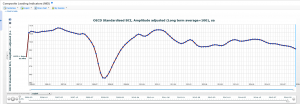The market continued its move higher as the overall stock market (VTI) advanced by 0.89%, the SP500 (SPY) was up 1.16% and the international markets x-USA (VXUS) had a 1.54% gain. For the year, the SPY is now off only 0.54%. The aggregate bond index (AGG) was roughly flat for the week, +0.037%.
ECB
The European Central Bank (ECB) announced it would lower the rate it charges banks by 10 basis points and would provide banks with long term cash. The cash would be free of charge but if it was loaned out there would be a 40 basis point cost. Monthly bond purchases would increase to $89b and would include buying non-financial European corporations with investment grade ratings. The market’s initial reaction was negative but then turned positive on that announcement.
ENERGY
The International Energy Association said it saw signs of a price bottom helping increase the price of crude oil to $38.50. Four weeks in a row of stable to higher oil prices have coincided with a four week stock market win streak.
MARKET TREND
The market has put in a strong performance over the last four weeks, but from a technical perspective, while the daily trend is up, the weekly trend is still down. The market needs to put in a higher low on the next downturn for that trend to flip. Nevertheless, this market has had ample opportunities to turn down in the last couple of weeks and has managed to push higher each time.
US ECONOMY
It was a light week for economic news, but we received another positive jobs report. Initial claims for unemployment dropped to 259k, marking the lowest reading of the year and the third lowest reading of this entire economic cycle.
With the generally good recent economic news including the strong employment reports as well as the recover of the equity markets, the chance for a couple of Fed interest rate increases is back on the table. The Fed meets this week. And while we don’t expect an increase this week, the probability for a move in the next few months is markedly higher now.
The latest GDPNow forecast from the Atlanta Fed came in at 2.2% on March 9th. Same level as the week before. So US estimated GDP growth for Q1 continues to appear to be positive.
EARNINGS
Companies are in an earnings recession. According to Factset, 99% of companies have now reported earnings. 69% beat their earnings estimate and 47% beat their sales estimate. The market sells at a forward p/e of 16.1, which is above the 5-year average of 14.4 and the 10 year average of 14.2. Looking forward to Q1, analysts have now cut estimated earnings by 8.8%. The 5-year average for the entire quarter is -4%. The estimated year over year earnings decline for Q1 is now -8.3%. At the start of the quarter, the estimated growth was +0.3%. Energy, materials and industrials are leading the decline. The estimated sales decline is -0.8%. Analysts are looking for positive earnings and revenue growth beginning in Q3. On an annualized basis, analysts are looking for earnings to increase 2.7% and revenues to increase 1.6% for 2016.
INCREASED CHANCE OF GLOBAL RECESSION
While economic news in the US has been improving, there has been a decline overseas. The odds of a global recession are now slightly higher than a few weeks ago. The OECD Composite Leading Indicator for OECD countries plus six key nonmember economies fell by 0.1 point in January to 99.1, the lowest level since September of 2009. When broken down by individual countries, only 47% of the composite leading indicators are now above their long term averages. According to Ned Davis Research, when less than one-half of the countries are above their long term averages the global economy has usually been in recession. However, a global recession does not necessarily mean a US recession and for now, the US appears to be continuing in slow growth mode. As we wrote on 2/12/16, when the global economy is in recession but the US isn’t, the loss in international equity indexes has been about 17%, compared to 45% when the US and the global economy is in recession.
SUMMARY
Overall, the equity markets have been strong over the last month. The US economy shows continued slow growth and led by strong employment reports, does not appear to be headed for an imminent recession in the next several months. Overseas, the global economy is slowing and the recession threat is now higher.

